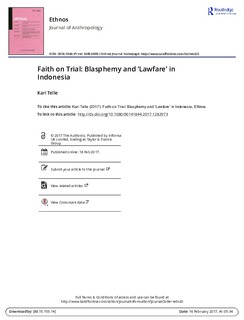| dc.contributor.author | Telle, Kari | |
| dc.date.accessioned | 2018-02-14T15:01:39Z | |
| dc.date.available | 2018-02-14T15:01:39Z | |
| dc.date.issued | 2018-01-01 | |
| dc.identifier | oai:www.cmi.no:6073 | |
| dc.identifier.citation | in Ethnos vol. 83 no. 2 pp. 371-391 | |
| dc.identifier.issn | 0014-1844 | |
| dc.identifier.uri | http://hdl.handle.net/11250/2484813 | |
| dc.description.abstract | This article develops the argument that blasphemy trials occupy a pivotal role in ‘religion-making’ in post-1998 Indonesia. Examining a blasphemy trial on the island of Lombok in 2010, I argue that the process of democratization has given civilian actors more opportunity to engage Indonesia’s blasphemy law, a process analysed in terms of ‘lawfare’. Examining the interplay of legal regulation and the campaign against ‘deviant’ religion launched by conservative Muslim groups, the article tracks the affective consequences of this regulation, showing how the blasphemy law inspires civilians to investigate suspected cases of heresy. While blasphemy trials purportedly protect religion from insult and foster religious order, this article argues that religion lawfare breeds suspicion and divisions among citizens.
The article is open access and available in full text | |
| dc.language.iso | eng | |
| dc.relation | Ethnos | |
| dc.relation | 2 | |
| dc.relation.ispartof | Ethnos | |
| dc.relation.ispartofseries | Ethnos | |
| dc.relation.ispartofseries | Ethnos vol. 83 no. 2 | |
| dc.relation.uri | https://www.cmi.no/publications/6073-faith-on-trial-blasphemy-and-lawfare-in-indonesia | |
| dc.subject | Blasphemy | |
| dc.subject | Trials | |
| dc.subject | Lawfare | |
| dc.subject | Indonesia | |
| dc.title | Faith on Trial: Blasphemy and 'lawfare' in Indonesia | |
| dc.type | Journal article | |
| dc.type | Peer reviewed | |
| dc.identifier.doi | 10.1080/00141844.2017.1282973 | |
| dc.identifier.cristin | 1448537 | |
